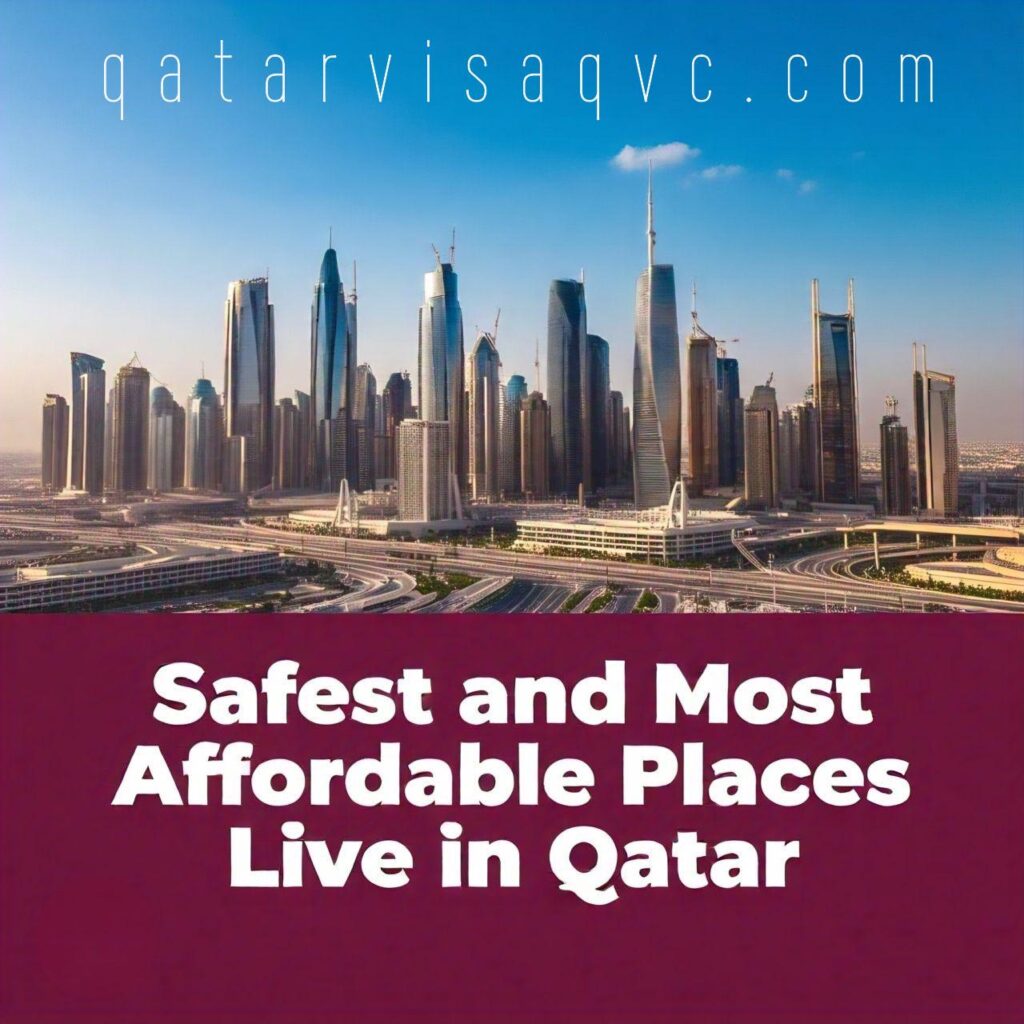I’ve traveled across Qatar and discovered incredible places that balance safety, affordability, and quality of life. Let me share my insights about the Safest and Most Affordable Places to Live in Qatar.
I’m excited to share the insider scoop on the most budget-friendly and secure neighborhoods you’ll want to call home. Imagine finding a place that keeps your wallet happy and your family safe – that’s exactly what I’m going to help you discover!
Geographic Overview
Qatar covers 11,571 square kilometers of strategic peninsula space, offering diverse residential options that balance safety, affordability, and quality of life. Understanding the nuanced residential environment requires deep insight into local characteristics.
Best Residential Areas in Qatar
Qatar’s residential areas offer diverse options for families, professionals, and expatriates. The country’s strategic urban planning has transformed residential spaces into world-class living environments. Key factors like location, infrastructure, and community amenities play crucial roles in determining the best residential zones.
1. Al Sadd
Location Highlights
- Central Doha neighborhood
- Close to major amenities
- Excellent public transportation
- Mix of apartments and villas
Living Costs
- Moderate rent prices
- Average 1-bedroom: 4,500-6,000 QAR
- Utilities: 500-800 QAR monthly
- Budget-friendly options
Safety Features
- Low crime rates
- Well-lit streets
- Close to police stations
- Community security
2. Al Wakrah
Neighborhood Overview
- Growing suburban area
- Family-friendly environment
- Near Hamad International Airport
- Modern infrastructure
Cost of Living
- Affordable housing options
- Rent: 3,500-5,500 QAR
- Lower utility expenses
- Economical living
Community Benefits
- Parks and recreation areas
- Shopping centers
- International schools
- Healthcare facilities
3. Lusail City
Modern Living
- Planned smart city
- Future development hub
- Sustainable infrastructure
- High-end residential zones
Price Range
- Competitive rental market
- 1-bedroom: 5,000-7,000 QAR
- Modern amenities included
- Investment potential
Safety Measures
- Advanced security systems
- Gated communities
- 24/7 surveillance
- Low crime statistics
4. Al Rayyan
Residential Advantages
- Suburban comfort
- Close to Education City
- Multiple housing options
- Family-oriented community
Living Expenses
- Competitive rental prices
- 3,000-5,500 QAR range
- Lower living costs
- Diverse housing types
Community Features
- Sports facilities
- Educational institutions
- Cultural centers
- Green spaces
5. The Pearl-Qatar
Luxury Living
- Artificial island
- International community
- Mediterranean-style design
- Premium residential area
Cost Considerations
- Higher-end pricing
- 6,000-10,000 QAR range
- Luxury amenities
- Marina views
Safety Standards
- Controlled access
- Private security
- Clean environment
- High-end infrastructure
Factors Affecting Living Costs
Housing Types
- Apartments
- Villas
- Shared accommodations
- Studio units
Rental Price Ranges
- Budget: 3,000-5,000 QAR
- Mid-range: 5,000-7,000 QAR
- Premium: 7,000-12,000 QAR
Cost Breakdown
- Rent
- Utilities
- Transportation
- Food expenses
Safety Considerations
Crime Statistics
- Low national crime rate
- Strict law enforcement
- Community policing
- Advanced security technology
Emergency Services
- Quick response times
- Modern infrastructure
- Well-equipped hospitals
- Efficient police force
Legal Protections
- Strong tenant rights
- Clear rental regulations
- Government oversight
- Transparent legal system
Immigration Considerations
Visa Requirements
- Work permit needed
- Sponsorship essential
- Employment contract
- Health checks
Residency Options
- Employment visa
- Family visa
- Student visa
- Investment visa
Documentation
- Passport
- Proof of income
- Health insurance
- Background checks
Cost of Living Tips
Budget Management
- Compare rental prices
- Negotiate lease terms
- Consider shared housing
- Use public transportation
Money-Saving Strategies
- Cook at home
- Use local markets
- Avoid tourist areas
- Plan expenses carefully
Financial Planning
- Create monthly budget
- Save emergency funds
- Understand tax rules
- Track expenses
Cultural Adaptation
Local Customs
- Respect local traditions
- Learn basic Arabic
- Understand dress codes
- Be culturally sensitive
Community Integration
- Join social groups
- Attend community events
- Network professionally
- Learn local practices
Language Considerations
- English widely spoken
- Arabic helpful
- Translation services
- Language classes available
Future Development
Qatar’s Vision
- Infrastructure improvements
- Smart city initiatives
- Economic diversification
- Sustainable development
Upcoming Projects
- New residential zones
- Transportation upgrades
- Technology integration
- Green living spaces
Investment Potential
- Real estate growth
- Economic stability
- Government support
- Foreign investment friendly
FAQs
Q: What are the most affordable areas in Qatar?
Top budget-friendly areas include:
- Al Sadd
- Al Wakrah
- Al Rayyan
- Lusail City
- Parts of Doha
Rental prices range from 3,000 to 7,000 QAR depending on location and apartment size.
Q: How safe are these residential areas?
Qatar consistently ranks as one of the safest countries globally:
- Low crime rates
- Strong law enforcement
- 24/7 security systems
- Community policing
- Advanced surveillance technologies
Q: What documents do I need to rent in Qatar?
Required documents typically include:
- Valid passport
- Work/residence visa
- Proof of income
- Employer letter
- Qatar ID
- Passport-sized photos
Q: Can foreigners buy property in Qatar?
Specific regulations apply:
- Limited ownership in designated areas
- Foreigners can buy in The Pearl-Qatar
- Specific investor visa requirements
- Need government approval
- Must meet financial criteria
Q: What visa do I need to live in Qatar?
Common visa types:
- Work visa
- Family residence visa
- Student visa
- Investment visa
- Investor visa
Q: How long can I stay with each visa type?
Visa duration varies:
- Work visa: 1-3 years
- Family visa: Matches sponsor’s visa
- Student visa: Academic program duration
- Tourist visa: 30 days (extendable)
Q: What’s the average monthly expense in Qatar?
Estimated monthly costs:
- Rent: 4,000-8,000 QAR
- Utilities: 500-1,000 QAR
- Food: 1,500-2,500 QAR
- Transportation: 500-1,000 QAR
- Total: 6,500-12,500 QAR
Q: Are utilities expensive in Qatar?
Utility costs depend on:
- Apartment size
- Usage patterns
- Season
- Location Average monthly utility bill: 600-1,000 QAR
Q: What salary do I need to live comfortably?
Recommended monthly income:
- Single: 10,000-15,000 QAR
- Family: 15,000-25,000 QAR
- Depends on lifestyle
- Location specific
Q: Which area is best for families?
Family-friendly neighborhoods:
- Al Rayyan
- Lusail City
- Parts of The Pearl-Qatar
- Al Sadd
Key family considerations:
- Schools nearby
- Safe streets
- Parks and recreation
- Community facilities
Q: Where do most expats live?
Popular expat areas:
- The Pearl-Qatar
- West Bay
- Lusail
- Al Sadd
- Education City
Q: What are tenant rights in Qatar?
Tenant protections include:
- Clear rental contracts
- Regulated rent increases
- Maintenance responsibilities
- Dispute resolution mechanisms
- Government oversight
Q: How do I transfer my residency?
Residency transfer process:
- Obtain release from current sponsor
- New sponsor approval
- Submit required documents
- Pay transfer fees
- Update Qatar ID
Q: Is healthcare expensive in Qatar?
Healthcare costs vary:
- Mandatory health insurance
- Employer often covers
- Private insurance options
- Government hospitals
- International clinics
Q: Do I need health insurance?
Insurance requirements:
- Mandatory for residents
- Employer provides for workers
- Comprehensive coverage needed
- Regular health checks
- Covers basic and emergency care
Q: Is Arabic knowledge necessary?
Language considerations:
- English widely spoken
- Arabic helpful for daily interactions
- Free language classes available
- Translation services exist
- Most official documents in English
Q: What cultural practices should I know?
Important cultural tips:
- Respect local traditions
- Modest dress code
- Ramadan observance
- Greet with respect
- Learn basic Arabic phrases
Q: How is public transportation?
Transportation options:
- Modern metro system
- Bus networks
- Taxi services
- Ride-sharing apps
- Future tram projects
Q: Is owning a car expensive?
Car ownership costs:
- Affordable car prices
- Low fuel costs
- Easy parking
- Good road infrastructure
- Comprehensive insurance options
Q: Is Qatar good for long-term living?
Long-term living advantages:
- Economic stability
- Tax-free income
- Modern infrastructure
- Cultural diversity
- Government development plans
Q: What future developments are expected?
Upcoming developments:
- Smart city initiatives
- Infrastructure upgrades
- Sustainable living projects
- Technology integration
- Economic diversification
Conclusion
Selecting the right residential area in Qatar involves careful consideration of personal preferences, budget, and lifestyle requirements. Each neighborhood offers unique advantages catering to different demographic groups.
This guide provides comprehensive insights into the safest and most affordable places to live in Qatar, helping you make an informed residential choice.
Remember, each person’s experience is unique. Research thoroughly and visit potential areas before making a final decision about living in Qatar.

